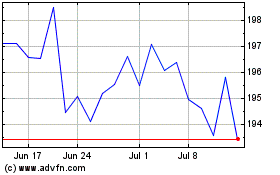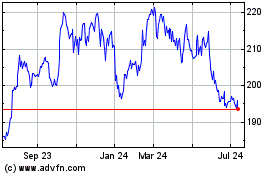UPDATE: ELX Calls On CFTC To Open Treasury Futures Market
January 05 2010 - 4:27PM
Dow Jones News
U.S. regulators have been drawn into an ongoing battle between
CME Group Inc. (CME) and the start-up challenging the dominance of
the world's largest derivatives exchange in the Treasury futures
market.
ELX Futures LP has asked the Commodity Futures Trading
Commission to order CME to accept trades that would allow contract
positions to be shifted between their respective
clearinghouses.
CME has so far resisted accepting the trades, a move that ELX
said blunts its competitive position.
ELX made its push this week in a letter to CFTC Chairman Gary
Gensler. "We think it's absolutely clear that this is within the
CFTC's power, and that for many reasons they need to execute that
power," said ELX Chief Executive Neal Wolkoff in an interview.
The months-long disagreement is focused on the movement of
Treasury futures positions between ELX and CME, which controls 97%
of the market.
ELX, an electronic exchange launched last summer and backed by a
consortium of banks and trading firms, is the latest challenger in
a segment that a number of other exchanges have failed to crack
over the past decade.
New York-based ELX secured CFTC approval in October for its
so-called Exchange of Futures for Futures rule, or EFF.
The process would allow investors to negotiate transactions
privately to shift Treasury futures positions from CME's
clearinghouse to the Options Clearing Corp., which clears trades
for ELX, and vice versa.
The idea, according to ELX, would allow investors to offset
positions held at the two markets and help traders sidestep margin
calls where there is no market risk.
CME officials have said the Chicago-based exchange operator
doesn't have to accept such transactions, citing a long-standing
policy of prohibiting "transitory trades."
In its letter to the CFTC, ELX said that CME's prohibition has
had a "significant chilling effect" that has kept investors from
trying to do an EFF trade.
"Indeed, no rational market participant would execute an EFF
involving ELX when it has been advised that it may face enforcement
action from CME Group, the dominant exchange in the marketplace,"
wrote Kenneth Raisler, a lawyer for ELX, in the letter.
Gensler has publicly declined comment on the matter. CFTC staff
have been looking into it and recently met with ELX officials, who
assert that CME would not be deprived of trading revenue by
allowing EFF transactions and that CME permits similar sorts of
trades in its energy markets.
"We're asking the CFTC to direct CME, by order, to permit the
execution of EFFs in accordance with the rule," said Wolkoff. "They
have that power and we don't believe that any additional
rule-making on the part of CME or CFTC is required."
A spokesman for CME said that "we have shared our views with the
CFTC and will continue to work with them on this matter."
A CFTC spokesman declined to comment.
-By Jacob Bunge, Dow Jones Newswires; 312-750-4117;
jacob.bunge@dowjones.com
CME (NASDAQ:CME)
Historical Stock Chart
From Jun 2024 to Jul 2024

CME (NASDAQ:CME)
Historical Stock Chart
From Jul 2023 to Jul 2024
